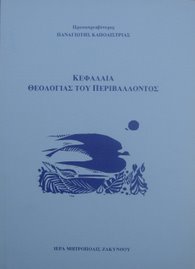Hurt not the earth, neither the seas nor the trees. (Rev. 7.3)
June 8, 2016
World Oceans Day celebrates one of the most precious gifts of our Creator, a gift that we are called to preserve and conserve.
Over the past two decades, the Ecumenical Patriarchate has highlighted the deteriorating condition of the world’s oceans. Now, more than ever, it is crucial to respect and protect this invaluable and inalienable resource of our planet, which is a unique source of nurture and biodiversity.
As industrial development becomes the norm of global behavior, so too our dependency on fossil fuels drives society’s indifference toward creation care. This fosters ever rising levels of greenhouse gases into the atmosphere, which in turn irreversibly pollute the earth’s atmosphere, creating the conditions that allow for climate change and disruption. Furthermore, about one-third of carbon emissions dissolve into the ocean causing rising levels of acidification. This acidification is killing coral reefs, dissolving the shells of clams, oysters and other shellfish, while also destroying the bottom of the ocean food chain.
Many of us unfortunately cannot comprehend these consequences of climate change due to our complacent and perhaps even complicit circumstances. However, the more vulnerable among us – who depend on the oceans for food and sustenance – understand this dire situation as they witness changing conditions in the ocean and rising sea levels from melting polar icefields.
Still, we are all called to remember that what we put into our waters can be equally as harmful as what we take out of the oceans. The way that we pollute our oceans – whether intentionally through non-biodegradable waste or inadvertently through relentless use of fossil fuels – is as destructive as overfishing and harvesting.
In addition to this, basic human rights are at risk when we fail to protect the oceans. We have often tried to draw connections between our attitudes and our actions. The way we defile the oceans is reflected in the way we exploit its resources, which is directly related to the way we treat our fellow human beings, particularly the marginalized and less fortunate of our brothers and sisters.
Therefore, if we have created the dire conditions that we now face, we are equally accountable for and capable of remedying the health of our environment. Each of us must learn to appreciate the way in which our individual and collective lifestyles – our choices and priorities – impact the environment.
Finally, we call upon global leaders, as they apply the 2015 Paris Agreement and seek new ways to reduce carbon emissions, to consider proposals that preserve the planet’s oceans and protect the world’s people. Rather than merely embracing profit-driven models of development, it is time for right changes that sustain the integrity and beauty of the world’s oceans and all God’s creation.














Δεν υπάρχουν σχόλια:
Δημοσίευση σχολίου